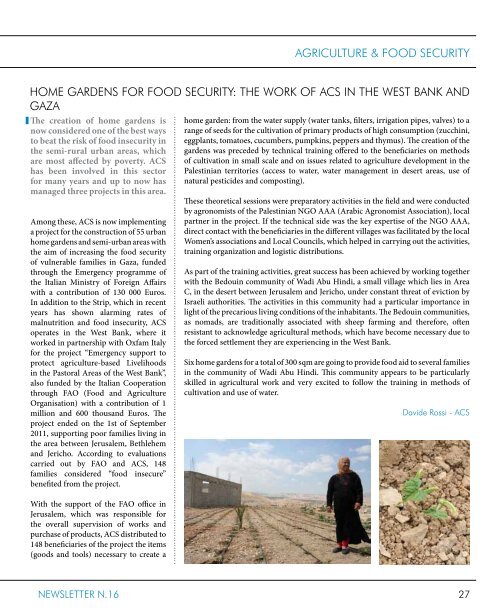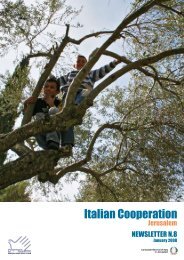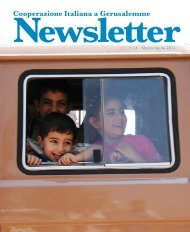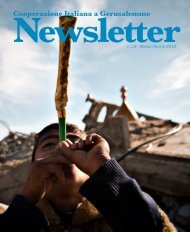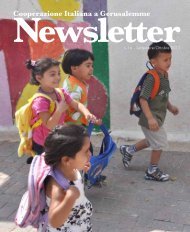newsletter n.16 - Gerusalemme
newsletter n.16 - Gerusalemme
newsletter n.16 - Gerusalemme
Create successful ePaper yourself
Turn your PDF publications into a flip-book with our unique Google optimized e-Paper software.
agriculture & food security<br />
Home gardens for food security: the work of ACS in the West Bank and<br />
Gaza<br />
The creation of home gardens is<br />
now considered one of the best ways<br />
to beat the risk of food insecurity in<br />
the semi-rural urban areas, which<br />
are most affected by poverty. ACS<br />
has been involved in this sector<br />
for many years and up to now has<br />
managed three projects in this area.<br />
Among these, ACS is now implementing<br />
a project for the construction of 55 urban<br />
home gardens and semi-urban areas with<br />
the aim of increasing the food security<br />
of vulnerable families in Gaza, funded<br />
through the Emergency programme of<br />
the Italian Ministry of Foreign Affairs<br />
with a contribution of 130 000 Euros.<br />
In addition to the Strip, which in recent<br />
years has shown alarming rates of<br />
malnutrition and food insecurity, ACS<br />
operates in the West Bank, where it<br />
worked in partnership with Oxfam Italy<br />
for the project “Emergency support to<br />
protect agriculture-based Livelihoods<br />
in the Pastoral Areas of the West Bank”,<br />
also funded by the Italian Cooperation<br />
through FAO (Food and Agriculture<br />
Organisation) with a contribution of 1<br />
million and 600 thousand Euros. The<br />
project ended on the 1st of September<br />
2011, supporting poor families living in<br />
the area between Jerusalem, Bethlehem<br />
and Jericho. According to evaluations<br />
carried out by FAO and ACS, 148<br />
families considered “food insecure”<br />
benefited from the project.<br />
With the support of the FAO office in<br />
Jerusalem, which was responsible for<br />
the overall supervision of works and<br />
purchase of products, ACS distributed to<br />
148 beneficiaries of the project the items<br />
(goods and tools) necessary to create a<br />
home garden: from the water supply (water tanks, filters, irrigation pipes, valves) to a<br />
range of seeds for the cultivation of primary products of high consumption (zucchini,<br />
eggplants, tomatoes, cucumbers, pumpkins, peppers and thymus). The creation of the<br />
gardens was preceded by technical training offered to the beneficiaries on methods<br />
of cultivation in small scale and on issues related to agriculture development in the<br />
Palestinian territories (access to water, water management in desert areas, use of<br />
natural pesticides and composting).<br />
These theoretical sessions were preparatory activities in the field and were conducted<br />
by agronomists of the Palestinian NGO AAA (Arabic Agronomist Association), local<br />
partner in the project. If the technical side was the key expertise of the NGO AAA,<br />
direct contact with the beneficiaries in the different villages was facilitated by the local<br />
Women’s associations and Local Councils, which helped in carrying out the activities,<br />
training organization and logistic distributions.<br />
As part of the training activities, great success has been achieved by working together<br />
with the Bedouin community of Wadi Abu Hindi, a small village which lies in Area<br />
C, in the desert between Jerusalem and Jericho, under constant threat of eviction by<br />
Israeli authorities. The activities in this community had a particular importance in<br />
light of the precarious living conditions of the inhabitants. The Bedouin communities,<br />
as nomads, are traditionally associated with sheep farming and therefore, often<br />
resistant to acknowledge agricultural methods, which have become necessary due to<br />
the forced settlement they are experiencing in the West Bank.<br />
Six home gardens for a total of 300 sqm are going to provide food aid to several families<br />
in the community of Wadi Abu Hindi. This community appears to be particularly<br />
skilled in agricultural work and very excited to follow the training in methods of<br />
cultivation and use of water.<br />
Davide Rossi - ACS<br />
NEWSLETTER N.16 27


